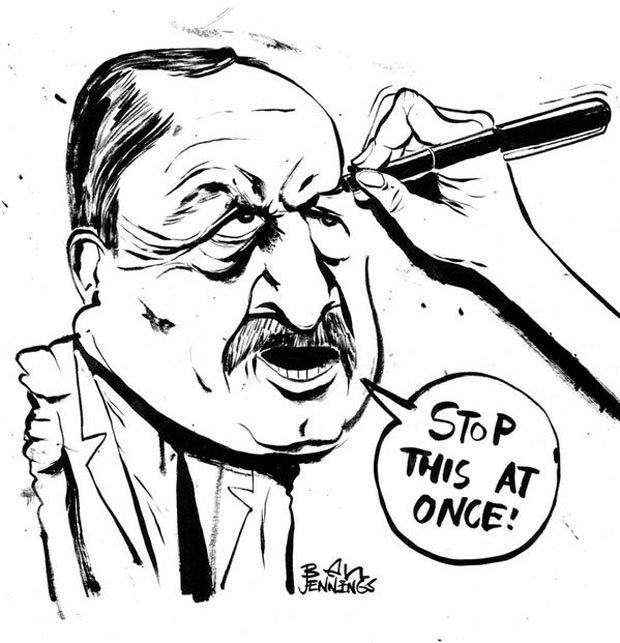
Cartoonists like Ben Jennings rallied around Musa Kart when he faced jail over a caricature of Turkey’s President Erdogan (Credit: Ben Jennings)
Not long ago Turkish cartoonist Musa Kart faced the prospect of spending nine years behind bars, simply for doing his job.
Taken to court by the Turkey’s President (and former Prime Minister) Recep Tayyip Erdogan himself, Kart last week stood trial for insult and slander over a caricature published in newspaper Cumhuriyet in February. Commenting on Erdogan’s alleged hand in covering up a high-profile corruption scandal, the cartoon depicted him as a hologram keeping a watchful eye over a robbery.
While Kart was finally acquitted last Thursday, his case was just starting to hit international headlines — in no small part due to the swift reaction from colleagues around the world. In the online #erdogancaricature campaign initiated by British cartoonist Martin Rowson, his fellow artists shared their own drawings of the president. With Erdogan reimagined as everything from a balloon, to a crying baby, to Frankenstein’s monster, the show of solidarity soon went viral.
“This campaign has showed me once again that I m a member of world cartoonists family. I am deeply moved and honoured by their support,” Kart told Index in an email.
Kart has been battling the criminal charges since February. His defiance was clear for all to see when he told the court on Thursday that “I think that we are inside a cartoon right now”, referring to the fact that he was in the suspect’s seat while charges against people involved in the graft scandal had been dropped.
He remains defiant today: “Erdogan would have either let an independent judiciary process to be cleared or repressed his opponents. He chose the second way,” he said. “It’s a well known fact that Erdogan is trying to repress and isolate the opponents by reshaping the laws and the judiciary and by countless prosecutions and libel suits against journalists.”
This isn’t the first time Kart has run into trouble with Erdogan. Back in 2005, he was fined 5,000 Turkish lira for drawing the then-prime minister as a cat entangled in yarn. The cartoon represented the controversy that surrounded Turkey’s highest administrative court rejecting new legislation that Erdogan had campaigned on.
“I have always believed that cartoon humour is a very unique and effective way to express our ideas and to reach people and it contributes to a better and more tolerant world,” he explained when questioned on where he finds the strength to keep going.
It remains unclear whether the story ends with this latest acquittal decision. While the charges against Kart were dropped earlier this year, an appeal from Erdogan saw the case reopened. “Erdogan’s lawyers will…take the case to the upper court,” he said.
Kart’s experience is far from unique; free expression is a thorny issues in Erdogan’s Turkey. In the past year alone, authorities temporarily banned Twitter and YouTube and introduced controversial internet legislation. Meanwhile journalists, like the Economist’s Amberin Zaman, have been continuously targeted, as Index on Censorship’s media freedom map shows.
Kart is not optimistic about the future of press freedom in his country: “Unfortunately, day by day, life is getting harder for independent and objective journalists in Turkey.”
This article was originally posted on 31 October at indexoncensorship.org




